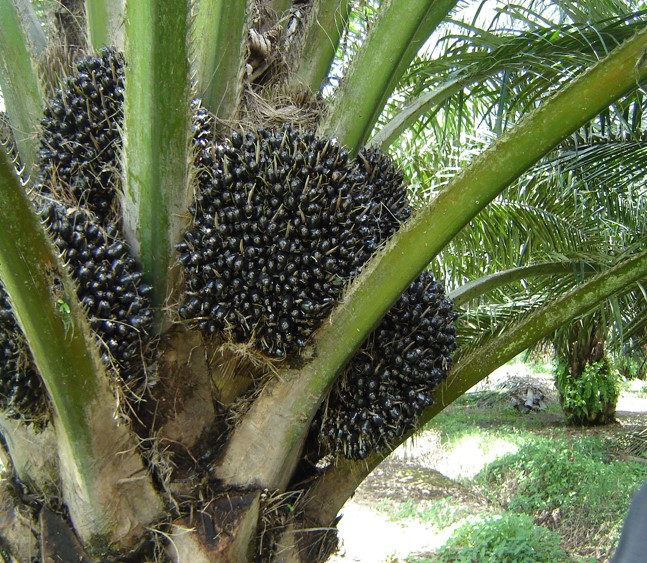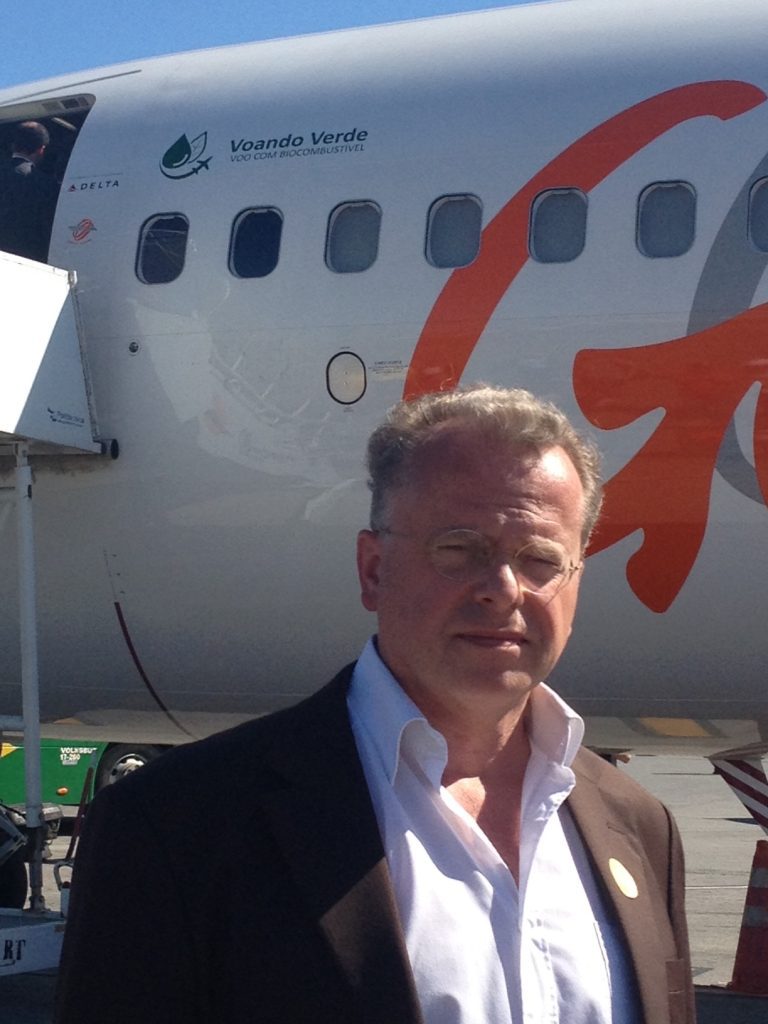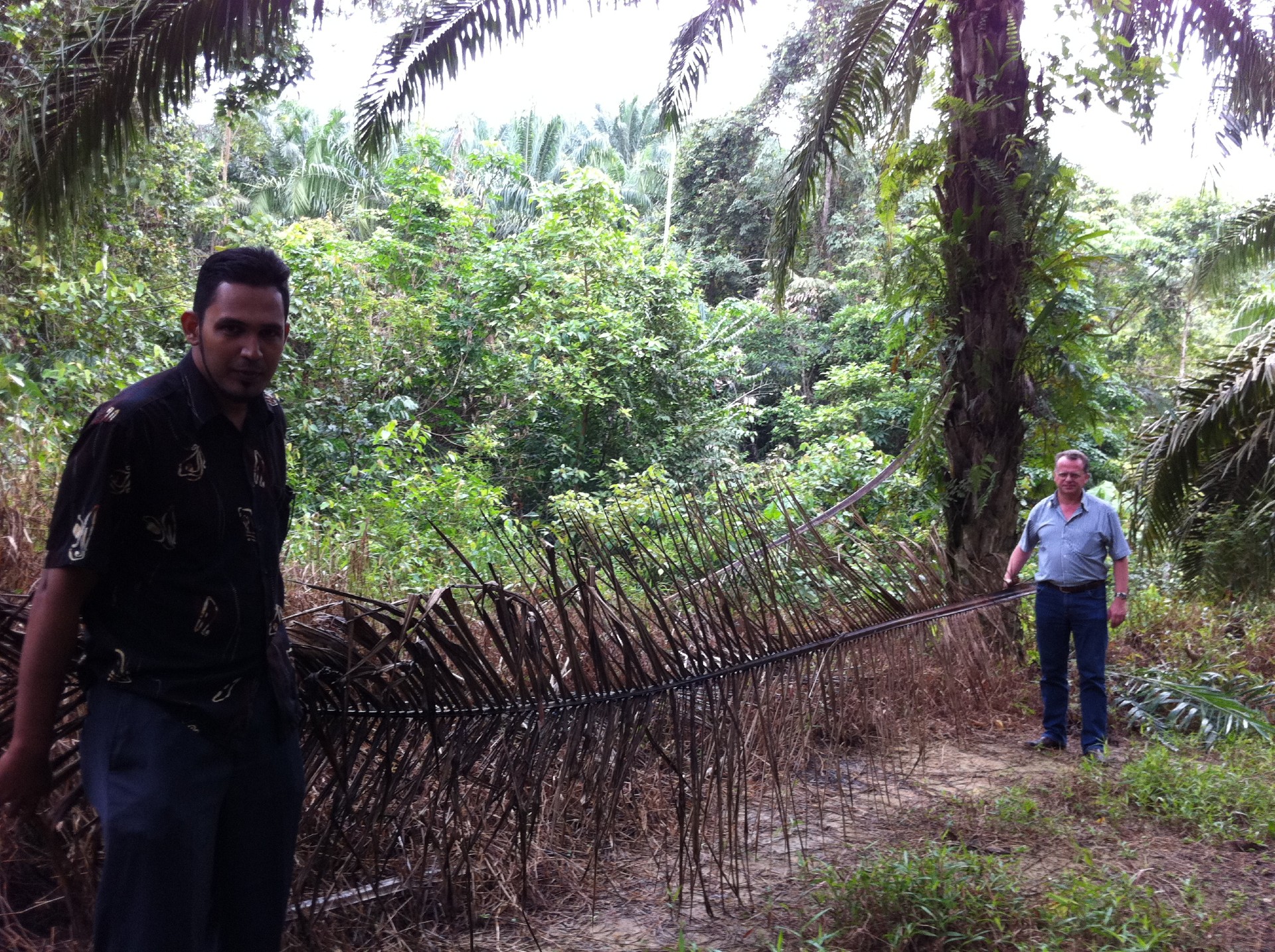On 16 November Luuk van der Wielen will present a summary of 13 years of BE-Basic, the stimulus programme for green raw materials. What has it brought?
In Malaysia, Luuk Van der Wielen (right) investigated whether raw materials for chemicals and fuels could be extracted from leaves and trunk of the oil palm. (Photo: Van der Wielen collection)
Professor Luuk Van der Wielen (Faculty of Applied Sciences), the initiator, and Maria van der Hoeven, the former Minister of Education, Culture and Science, with a dozen entrepreneurs on the stairs of the Glass Hall in The Hague. That was at the start of the BE-Basic programme in 2010. Its EUR 120 million budget was equally divided among Government, industry and knowledge institutions.
Delta quoted the Minister: “The programme will further the new economy in which non-food crops will be the basis for new materials and products. It will lead to new knowledge, jobs and opportunities. We are heading towards a post-fossil fuel era and a bio-based economy.”
Strictly speaking, BE-Basic’s history goes back further than 13 years. BE-Basic (biobased ecologically balanced sustainable industrial chemistry) is the continuation of the B-Basic programme that ran from 2004 to 2009. Both programmes were public-private partnerships whose goal was to develop bio materials for sustainable applications. The initial emphasis was on bio fuels, and later the programme expanded to new biological raw materials for food production, chemicals and materials. B and BE-Basic always concentrated on industrial applications for academic research.
‘The idea was always for the programme to have an end date’
Van der Wielen and his co-Board member Bram Brouwer will present their final balance to the Supervisory Board of BE-Basic on 16 November 2023. Of the EUR 155 million that the programme invested over time, about EUR 1.5 million remains. “If we spend 10% of the remaining amount every year, we will close in 10 years’ time,” Van der Wielen says in a video call from Limerick in Ireland. Van der Wielen heads the Bernal Institute there that carries out research into the manufacturing of structural materials for pharmaceutical, biomedical, energy and other applications.
Why close a programme that has been so successful?
“The idea was always for the programme to have an end date. This is why we did not turn it into an institute and never hired anyone on a permanent basis but had them outsourced from their original organisations. In the contracts the programme would run up to 2017, but as it was so big, starting it up and closing it took longer than expected. In 2019 we thought we were nearly done, but the projects were delayed because of Covid. And we are now at the point that we can close the programme, almost five years later than planned.”
BE-Basic originally concentrated on biofuels. How has this progressed?
“After about 15 years of BE-Basic, we saw that there was a shift in interest from innovative research towards the implementation of biofuels at the Faculty and with partners. There was not enough of a driving force to continue such a big programme, so it was time for a review. We now have a more balanced view of the bioenergy issue. We will still work on it, but bioenergy is not the most important part of the programme. There is a greater interest in the circularity of the base materials, which was also the original idea for bio-based circularity.”
 Palm oil comes from the berries, but the waste stream of leaves and fruit is three times larger by mass. (Photo: van der Wielen collection)
Palm oil comes from the berries, but the waste stream of leaves and fruit is three times larger by mass. (Photo: van der Wielen collection)Were there any projects that failed?
“We name six ‘lessons learned’ in our final report. One of them, that cost EUR 25 million, played out in Malaysia. The idea was to use the leaves, trunk and fruit discards of the oil palm after the palm oil was harvested as a raw material for chemicals and fuels. Palm oil is derived from the fruit, but the waste stream of leaves and fruit is three times larger in terms of mass. We have similar project partnerships in Brazil for the waste streams of sugar cane that work well. But in Malaysia there was a spoke in the wheel. Tim van der Hagen (Rector, Eds.) attended the signing of the major partnership agreement for the planned Oil Palm Biomass Center OPBC in March 2012 in Parliament under the watchful eye of the then Malaysian Prime Minister. Shortly after that everything stopped. We did not know what really happened, but it initially seemed as though the Arab Spring played a role. This started in Tunisia and at a certain point also played out in Malaysia. Quitting was an incredibly difficult decision, as OPBC could have brought so much good to the economy and environment of South East Asia, but progress was then out of reach. Looking back, I am happy that we decided not to continue the project as the Prime Minister was suspected of and later convicted for major fraud in the scheme.”
Could this have been avoided?
“The most important lesson is to know what you are doing if you enter into longer term partnerships. We were able to invest a lot of time and effort in Malaysia and Brazil thanks to the local presence of Dutch embassies and consulates and with the support of the Executive Board. This led to successful partnerships in Brazil. In Malaysia these efforts have at least avoided unpleasant situations.”
Now at the end of the journey there is still EUR 1.5 million left. What do you want to spend it on?
“Our Board and the Supervisory Board agreed that we will reserve the money for projects by the BE-Basic consortium partners that cannot easily get funding from regular subsidies. One thing I’m thinking about for example is a macro-economic study into the socio-economic effect of biobased sustainability projects. My intuition tells me that there are a lot of double calculations in the calculations of wind and bioenergy and I’m not the only one who thinks this. If anyone wants to do this research, let us know. There is a pot of money for it.”
You strive to work in and with countries abroad. Is this a conscious decision?
“Many of the election programmes (national elections will be held in the Netherlands in November, Eds.) do not look beyond the Netherlands. Pieter Omzigt’s party (NSC, Eds.) is concerned about study migration and so on. I do not believe this would be good for the Netherlands. Our country benefits from knowledge, and attracting and sending talent from and to the rest of the world. And this starts with simple things like stimulating students in international settings through study trips and so on. I am a child of the times. I have seen and experienced all sorts of advantages through internationalisation and would not like to see it being reversed.”
 Van der Wielen, now working in Ireland, is a strong advocate of internationalisation. (Photo: van der Wielen collection)
Van der Wielen, now working in Ireland, is a strong advocate of internationalisation. (Photo: van der Wielen collection)- 25% of the publications published in top journals; one-and-a-half articles per full-time researcher per year
- 13% of the budget spent on internationalisation (goal was 10%)
- 93% of the PhD candidates rounded off within five years; 95% found related jobs within six months
- EUR 7.5 million spent on ecology, safety, sustainability and circular nutrients (goal was EUR 4 million)
- 49% of the methodologies designed by BE-Basic implemented by third parties
- 40 patents submitted (goal was 60)
- 11 start-ups (goal was 3-5)
- 69 pilot studies carried out worth more than EUR 6 million
- BE-Basic 1’s financial leverage: 4.67 (goal was 1:4) so every euro invested in the programme generated EUR 4.67.
Do you want to know more? See the be-basic.org website.
Do you have a question or comment about this article?
j.w.wassink@tudelft.nl


Comments are closed.